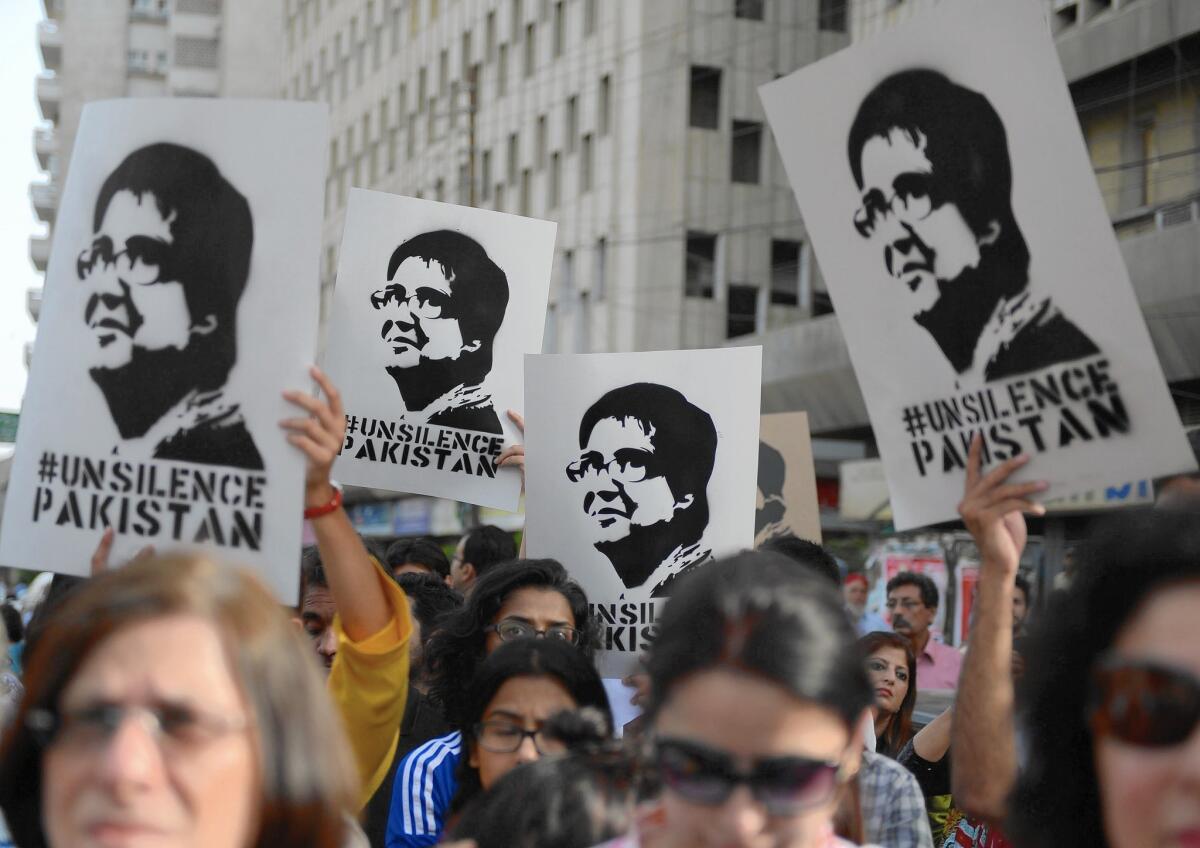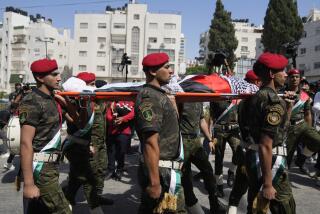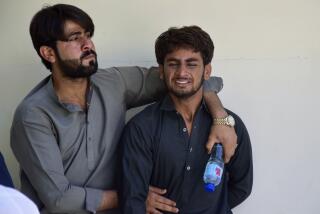Pakistani activists risk death in speaking out against religious extremism

Pin-drop silence followed as social activist Jibran Nasir, 28, screened a documentary on sectarian and religious violence in Pakistan. Nasir, who was on a six-week speaking tour of the United States, is among the few outspoken voices in Pakistan when it comes to religious extremism.
But the overall situation appears bleak. A few hours after Nasir’s talk last month at Pomona College on sectarianism and apathy, 45 members of a subsect of Karachi’s Shiite Muslim community were killed in an attack by Sunni Muslim militants.
In recent weeks, a string of slayings in Karachi and beyond has presented a grim picture for minorities in Sunni-dominated Pakistan, as well as for Pakistani human rights activists and others who speak out against injustices.
In late April, activist Sabeen Mahmud, 40, was struck and killed by four bullets after she left a Karachi meeting on missing people in Baluchistan, the strife-torn, mineral-rich province in western Pakistan. The session, titled “Unsilencing Baluchistan: Take 2,” had been scheduled to be held earlier in the month at the prestigious Lahore University of Management Sciences but was called off, reportedly after pressure from the government. Sabeen, who agreed to hold it instead at her Second Floor forum, was killed.
Several days later, a professor in the Mass Communications Department at Karachi University, Syed Waheed-ur-Rehman, was gunned down. His slaying remains unsolved.
Meanwhile, a senior educator and member of the government advisory board for textbooks and curriculum in Karachi, Bernadette L. Dean, fled Pakistan after receiving death threats from people she has referred to as “members of a political party.”
“We must give credit to people in Pakistan who are still willing to stand up and be counted,” said Ali Dayan Hasan, former director of Human Rights Watch in Islamabad, the capital. “But we must not overestimate their numbers or underestimate the risk to their lives. They are still a beleaguered and besieged minority.”
In an article he wrote in Guernica magazine in April 2014 after his friend and journalist Raza Rumi survived an attack in Lahore, he referred to the term “liberal extremist.” It is a title given to those who publicly condemn prejudice and abuse or are touted as “Western agents,” said Hasan, now a fellow at the United States Institute of Peace in Washington.
“But I have an aversion to this term liberal or progressive,” he said in a phone interview with the Los Angeles Times. “Because these are the universal values of tolerance and pluralism that are under attack. These values are not and should not be limited to a particular group of people to speak for.”
“Pakistan — and the cities, in particular — are becoming increasingly dangerous for liberal thought,” said Zohra Yusuf, chairwoman of the Human Rights Commission of Pakistan. “The intelligentsia is being targeted. The space is shrinking for liberal thinking while those propagating hatred towards minority communities carry on their campaigns unchecked. There is no clear policy on banned or militant outfits and the government is still reluctant to register madrassas or put any pressure on them.”
Authorities recently arrested four highly educated Pakistani men who they said were responsible for several targeted killings in Karachi. The assailants, the authorities said, had all graduated from college, with degrees in engineering, business and Islamic studies.
The announcement drew suspicion from some quarters that the arrests had been made hastily because of mounting pressure. Previously, officials had blamed the spate of killings on “interference by rival states, particularly the Indian intelligence agency, RAW.”
“There might be perhaps some truth to this fact,” Hasan said. “But it does not take away from the fact that the state persistently fails to protect its citizens. If the state doesn’t wish to be seen as a failed one, it must ensure security.”
The arrests were also met with shock in some quarters, that well-educated, tech-savvy young adults would turn to a life of militancy.
After showing the video and concluding his talk, Nasir was asked by a member of the audience in Claremont: “What are you doing for your security and how should we help you?”
Nasir responded that he doesn’t believe in personal security. He appeared frustrated by a similar question during an informal discussion later at the home of one of the event’s organizers.
“That’s the problem,” he said. “Don’t help me. Just be there when something happens and be counted. It’s as simple as that.”
Baloch, a reporter from Pakistan, is a visiting journalist at The Times sponsored by the Daniel Pearl Foundation in partnership with the Alfred Friendly Press Fellowships.
More to Read
Sign up for Essential California
The most important California stories and recommendations in your inbox every morning.
You may occasionally receive promotional content from the Los Angeles Times.










